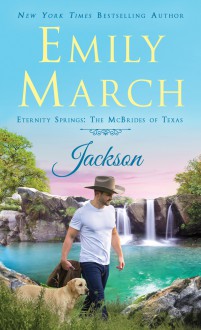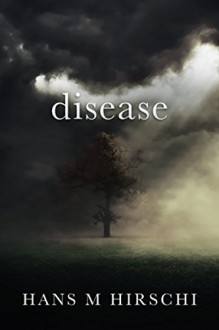
Thanks to NetGalley and to St. Martin’s Press for providing me an ARC copy of this book, which I freely chose to review.
I read and reviewed one of Emily Barr’s novels in the Eternity Springs series, The Christmas Wishing Tree, last summer and enjoyed it, particularly the lovely town of Eternity Springs, and I could not resist checking what her new story was like.
This novel is a crossover (or a spin-off, I guess) of that other series, as it does include quite a few of the characters of Eternity Springs, and, in fact, Celeste Blessing plays quite a part in getting things started, but it focuses on three male cousins, the McBrides, who are very close in age and grew up together, share wonderful memories, but have taken very different paths in life. They are left a pretty interesting legacy from their great-aunt, and it gives them an opportunity to start a project together, in Texas.
Jackson McBride, the protagonist of the story (or one of them. Caroline Carruthers plays a very important part in the story, if not the most important), is a musician, a composer of Americana/country music, who’s been unable to compose since his marriage ended, and he lost the custody battle for his little girl, Hailey. But his love for music remains unabated, and the project at Last Hope gives him a different avenue to invest it on, one that will allow him to help other performers and recover a historical venue.
We meet Caroline Carruthers at a difficult time in her life. She married a man fifteen years older than her, a professor, when he was quite young, and she seems to have become his wife, first and foremost. She writes articles about Texas for magazines, but her life is turned upside down when her husband is diagnosed with early dementia. Her sister-in-law does not accept her decision of having her husband looked after in a nursing home, and the situation brings home just how dependent Catherine has become on her husband and how limited her personal support network is. A chance encounter with Celeste makes her discover Redemption, Texas, and she gets a second chance.
This novel shares many of the characteristic that made me enjoy the previous one. Redemption is a pretty interesting and welcoming place, Enchanted Canyon Ranch, and Ruin, the ghost town, are great settings, beautiful, magical, and we get to see how Angelica (Celeste’s cousin, another cousin in a book full of them, and my favourite character), Jackson, and Boon transform the place into a haven, the Texan cousin of Celeste’s inn at Eternity Springs. The landscape and descriptions of the natural beauty of the area are vivid and make readers wish they could be there, and the writer captures well the language, customs, and local expressions (even if it some of the situations ring of an adult fairy tale). There are also great secondary characters, some that are likely to play bigger parts in other books in the series, and for those readers who are already familiar with Eternity Springs, there are plenty of familiar faces who make an appearance here (even I, who’ve only read one of the books, recognized quite a few). I also enjoyed the relationships between friends and family members, and the interactions between the cousins had that ease and familiarity that made them ring true. There is plenty of humour, some drama (yes, bad things happen and there’s grief in store for many of the characters), and a fairly gentle story, with bickering and discussions over decorating and sports, music, dogs, food, families and friendships.
The main characters are likeable, have suffered in their personal lives, and deserve a second chance. They are both reluctant to commit to new relationships because they are grieving for their last ones, but… Well, I was going to say this is a romance after all, and it is, but it also has much in common with women’s fiction, despite the male coprotagonist. Caroline grows strong throughout the book, takes control of her own life, and acquires a network of female friends who support her no matter what. Jackson already had his cousins, although they all seem to keep secrets, and his recovery involves helping his ex-wife stand tall and start behaving like an adult. Women are the ones who change and grow the most throughout the novel, and although their roles might appear conventional at first, they prove they are stronger and more determined than they thought. As I said, I found the characters likeable, but I felt about them a bit like I would about a nice couple I’d met and chatted one evening. I have the best wishes for them, and I wouldn’t mind seeing them around every now and then, but I don’t think they’ll leave a lasting impression, and there wasn’t anything particularly distinctive or memorable about them (although I liked the sound of Caroline’s bookshop, The Next Page).
I read some reviews that complained about the references and inclusion of characters not directly related to the stories, and got a bit lost. As I said, I have met some of the characters before, so I was slightly more familiar with them, but I wouldn’t let that scare any possible readers, as it is not a big part of the book, and it does not hinders the understanding of the action. (It involves the chapters around the opening of the new inn, and Boon’s friends from Eternity Springs turn up as guests, and that means a fair amount of new people who suddenly land there). On the other hand, I’m pretty convinced that readers of the series will be delighted to catch up with some of their favourite characters in the new setting.
This is a nice and gentle read, with no violent or sex scenes, in an enchanting Texan setting , likely to appeal to readers of romance, especially that set in the world of the music industry, Americana in particular, women’s fiction, and stories about second chances. The characters don’t break any molds, and it is not a particularly challenging story, but it is a comforting one. Recommended to readers of the Eternity Springs series and to anybody keen on a refreshing and gently inspiring story.

 Log in with Facebook
Log in with Facebook 






